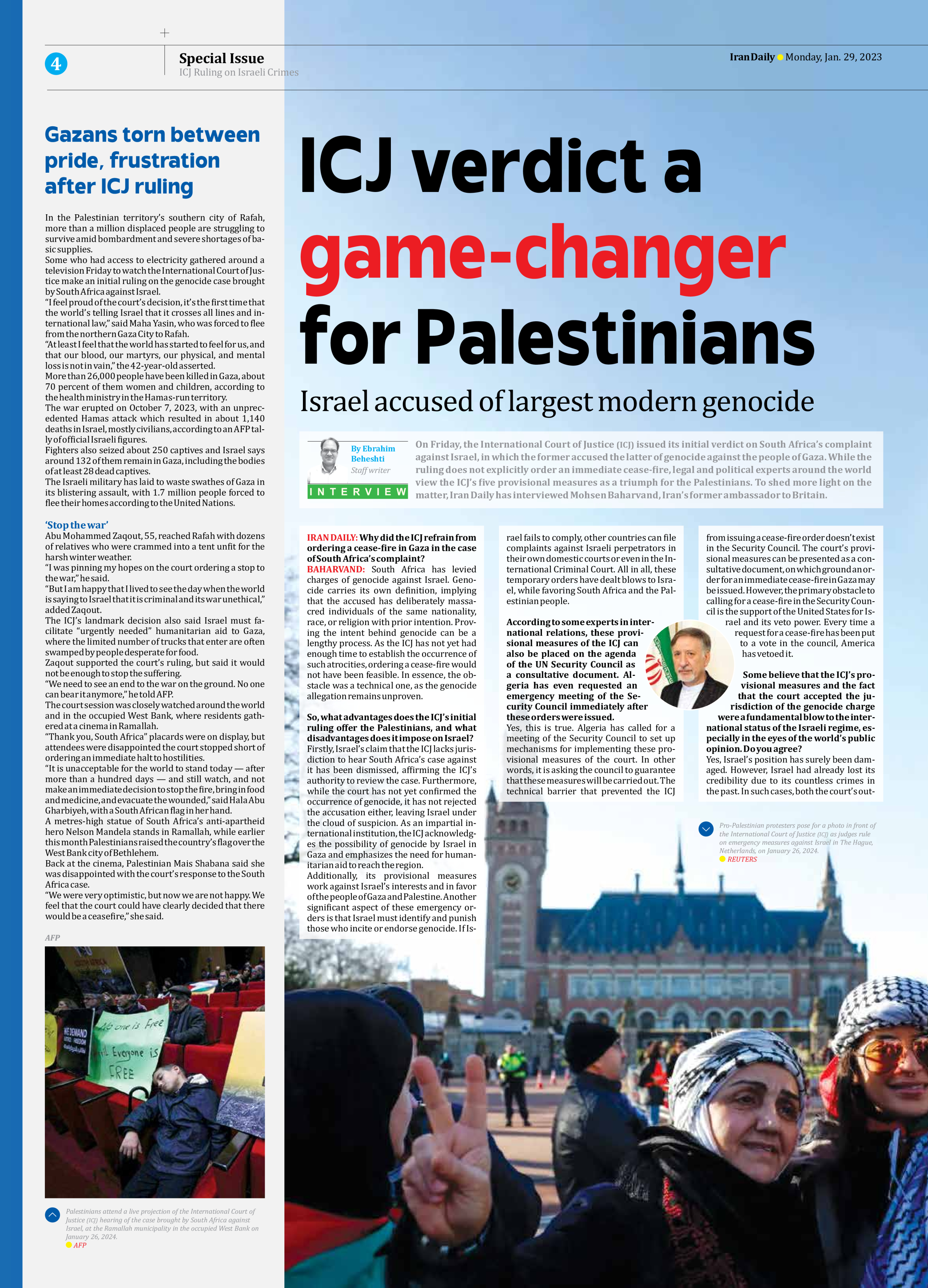
ICJ verdict a game-changer for Palestinians
Israel accused of largest modern genocide
By Ebrahim Beheshti
Staff writer
On Friday, the International Court of Justice (ICJ) issued its initial verdict on South Africa’s complaint against Israel, in which the former accused the latter of genocide against the people of Gaza. While the ruling does not explicitly order an immediate cease-fire, legal and political experts around the world view the ICJ’s five provisional measures as a triumph for the Palestinians. To shed more light on the matter, Iran Daily has interviewed Mohsen Baharvand, Iran’s former ambassador to Britain.
IRAN DAILY: Why did the ICJ refrain from ordering a cease-fire in Gaza in the case of South Africa’s complaint?
BAHARVAND: South Africa has levied charges of genocide against Israel. Genocide carries its own definition, implying that the accused has deliberately massacred individuals of the same nationality, race, or religion with prior intention. Proving the intent behind genocide can be a lengthy process. As the ICJ has not yet had enough time to establish the occurrence of such atrocities, ordering a cease-fire would not have been feasible. In essence, the obstacle was a technical one, as the genocide allegation remains unproven.
So, what advantages does the ICJ’s initial ruling offer the Palestinians, and what disadvantages does it impose on Israel?
Firstly, Israel’s claim that the ICJ lacks jurisdiction to hear South Africa’s case against it has been dismissed, affirming the ICJ’s authority to review the case. Furthermore, while the court has not yet confirmed the occurrence of genocide, it has not rejected the accusation either, leaving Israel under the cloud of suspicion. As an impartial international institution, the ICJ acknowledges the possibility of genocide by Israel in Gaza and emphasizes the need for humanitarian aid to reach the region.
Additionally, its provisional measures work against Israel’s interests and in favor of the people of Gaza and Palestine. Another significant aspect of these emergency orders is that Israel must identify and punish those who incite or endorse genocide. If Israel fails to comply, other countries can file complaints against Israeli perpetrators in their own domestic courts or even in the International Criminal Court. All in all, these temporary orders have dealt blows to Israel, while favoring South Africa and the Palestinian people.
According to some experts in international relations, these provisional measures of the ICJ can also be placed on the agenda of the UN Security Council as a consultative document. Algeria has even requested an emergency meeting of the Security Council immediately after these orders were issued.
Yes, this is true. Algeria has called for a meeting of the Security Council to set up mechanisms for implementing these provisional measures of the court. In other words, it is asking the council to guarantee that these measures will be carried out. The technical barrier that prevented the ICJ from issuing a cease-fire order doesn’t exist in the Security Council. The court’s provisional measures can be presented as a consultative document, on which ground an order for an immediate cease-fire in Gaza may be issued. However, the primary obstacle to calling for a cease-fire in the Security Council is the support of the United States for Israel and its veto power. Every time a request for a cease-fire has been put to a vote in the council, America has vetoed it.
Some believe that the ICJ’s provisional measures and the fact that the court accepted the jurisdiction of the genocide charge were a fundamental blow to the international status of the Israeli regime, especially in the eyes of the world’s public opinion. Do you agree?
Yes, Israel’s position has surely been damaged. However, Israel had already lost its credibility due to its countless crimes in the past. In such cases, both the court’s outcome, i.e., the final verdict issued, and the process of handling the case are significant.
The court has not yet delivered a final decision, and it may take some time for the review and issuance of a decision. However, the process of handling the case itself holds importance. Accusing Israel of genocide has generated various international reactions and placed this regime under international pressure. Israel must be held accountable for the allegations and for complying with the temporary orders.
The issue of the Gaza war and Israeli crimes has now entered new phases, namely of accusing Israel of genocide and the violation of human rights and international conventions related to wars. Why do you think America, which claims to champion human rights in the world, remains a staunch supporter of Israel?
Unconditional support for Israel is part of the US strategy. For instance, Washington, in response to the same court decision, labeled it as meritless. Despite being a member of the International Court of Justice, it cannot jump to conclusions. Like other countries, the US can express its opinion during the content review of the case. However, here, it cannot impose its viewpoint on others and obstruct the proceedings and voting through veto power, as it does in the Security Council. The United States has long been openly undermining international law, which has cost it its moral advantage in the world. Hence, it can no longer be said that the US maintains its former position as a champion of human rights. In effect, the issuance of provisional court measures favoring Palestinians as well as Washington’s open opposition to the measures will further weaken its international standing.







